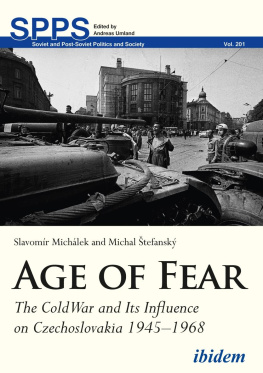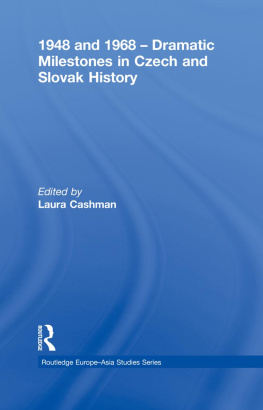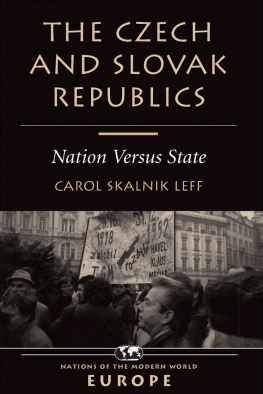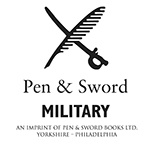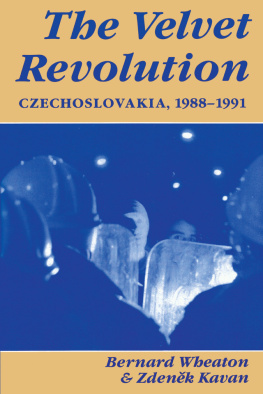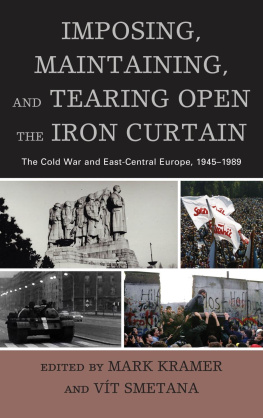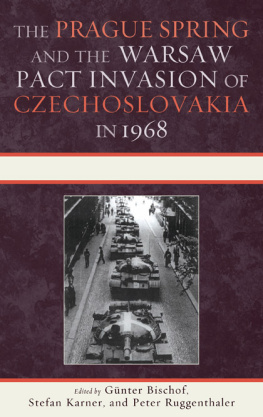Introduction
The shock waves of the Second World War were still reverberating when the Cold War began. Two of the wars victorious Allied powersthe United States of America and the Soviet Unionsoon after commenced to compete against each other for spheres of influence, including with regard to the composition of the coalition governments in Poland and Yugoslavia, international security via the United Nations, and control of Germanys occupation zones etc. Although their differences were still in formation, disputes between the USA and the Soviet Union were kept hidden from public view in the hope that they could be overcome and that the wartime cooperation of the Big Three Allies (the USA, Soviet Union, and Great Britain) would carry over into the post-war period. However, Franklin Roosevelts belief that it was possible to come to an agreement with good uncle Joe (Joseph Stalin), because the Soviet Union was entitled to having its security demands in Europe and Asia met, quickly dissipated when Harry Trumans administration came into power in the US.
Soviet ideas regarding the post-war arrangement of continental Europe and Asia were clearly outlined in the treatises of the leading Soviet diplomats and politicians, Ivan Maisky and Maxim Litvinov, who addressed the Ministry of Foreign Affairs before the war was over. From the treatises of Maisky and Litvinov it was apparent that the Soviet sphere of interest, even before June 1941, included new regions in the north, west, and south of the Soviet border. The Soviet Unions intention was to extend its influence into Central Asia and, to the detriment of Japan, into the Far East via division of the region into occupation zones similar to Germanys, among other methods. However, post-war development did not follow the course set out in Maisky and Litvinovs original analyses. There were several reasons for this, both internal and external, but one was particularly crucial and decisive: Stalins foreign policy was cobbled together without defined short-term goals, creating a Soviet bloc with the regimes as we know them from the late 1940s.
Roosevelts policy in relation to the Soviet Union was criticized by George F. Kennan, US diplomacys long-term expert and a recognised authority on the Soviet reality, who disclosed the nature of the Soviet policy and ideology as a threat to the world as early as 1945. According to Kennan, an architect of the definition of the Cold War, Moscow fed off of a feeling of insecurity to justify its aggressive steps, and only understood the arguments of power. Kennans opinion was reflected in US policy throughout the course of the Cold War.
Until 1944, the United States had shown little interest in the post-war fate of Central and Eastern Europe, because it assumed the regions would fall under the British sphere of interest. But in post-war arrangements, Britain did not succeed in putting into practice its plans to create federations or confederations in Central and Eastern Europe. Britains main obstruction was the refusal of the Soviet Union, which considered such action a hindrance to Soviet westward political penetration in the wake of Germanys defeat. The Soviets categorical no to federations thus buried any plans for a Third Europe, which would have seen Poland play a key role in Central-Eastern Europe. For the same reasons, an earlier plan to establish a Czechoslovak-Polish confederation, and a later plan for a Balkan federation, also had no hope for success. When the confederation plan fell through, Czechoslovakias president-in-exile, Edvard Bene, sought a solution in signing the Treaty of Friendship, Mutual Assistance and Post War Cooperation with the Soviet Union in December 1943, which predetermined Czechoslovakias future course. The further signing of treaties between small countries and the superpowers was to be prevented by the principle of self-limitation, so that alliance treaties could not create post-war spheres of influence and control. The USSR abandoned this principle shortly after the War, which meant that its own alliance treaties with countries ruled by Peoples Democracy regimes, as well as mutual treaties between such countries, were in fact constructing the Soviet bloc.
The formation of two antagonistic blocs headed by the United States and the Soviet Union was, from the very beginning, marked by disputes and confrontations in the political, military, economic, and ideological realms. Such developments were sped-up by the Truman Doctrine, the Marshall Plan, the founding of the Federal Republic of Germany (FRG), and NATO on one hand, and Soviet ideological and political expansion into Central and Eastern Europe, the establishment of Cominform, and Communists seizing power in states adhering to the concept of Peoples Democracy, on the other. Peoples Democracies thus ceased to be led by centrist-leftist coalition governments; a monopoly on power was acquired by the Communists, who considered the Peoples Democracy concept a form of dictatorship over the proletariat. The Prague Communist coup dtat in Czechoslovakia in February 1948 buried the ideas of domestic non-Communist politicians for a Czechoslovak road of development and of Czechoslovakia serving as a bridge between the east and the west.
The first Berlin crisis in 1948-1949, and especially the Korean War in the early 1950s, transformed the Cold War through militarization. Military force came to be considered to have the greatest impact in the decision-making and relations between the superpowers and their satellites. Militarization was accompanied by a drastic increase in arms spending and the construction of large and modern armies in possession of nuclear weapons. The development of a robust weaponry production in Czechoslovakia, which drew on traditions of the past, fulfilled several important goals. Besides supplying and modernizing weapons for the needs of its own army and those of other Peoples Democracies, Czechoslovak weapon-making factories also supplied the armies of several developing countries. The Soviet Union utilized Czechoslovakias already well-established interwar relations with countries of the near and Middle East and countries in Latin America to assert influence and control. A significant supply of Czechoslovak and Soviet weapons to Egypt in 1955 shifted the balance of military forces in relation to Israel and, with the substantial assistance of Czechoslovak weapons, Cuba deflected military invasion at the Bay of Pigs in April 1962.
Stalins invariable disputes between the powers, since the establishment of the occupation zones in 1945, became a question for the Germans, especially after the formation of two German states. Conflicts related to the access of western countries into West Berlin caused two major crises which threatened to grow into a military conflict between the bloc powers. Various plans to unify Germany prior to 1990 failed due to the rejection of free elections in the whole of Germany, on the basis of which an all-German democratic government could have been formed. In other words, free elections would have put an end to the German Democratic Republic, meaning that they could only take place after the close of the Cold War.
Conflicts within the Soviet bloc were present from its origins at the end of the 1940s. These internal conflicts became a part of the Cold War because both superpowers used them to ideologically attack the other, as a means of politically and economically disparaging the enemy, and via mutual accusations of interference in internal affairs. This was true in relation to the Polish October crisis and the Hungarian Uprising in 1956, as well as the Prague Spring in Czechoslovakia in 1968. A comprehensive documents-based analysis of the internal Soviet bloc conflict, with regard to the events in Czechoslovakia, disproves the frequently cited opinion that the United States approved of the military intervention into Czechoslovakia in 1968, referring to the 1945 Yalta agreements concerning the division of spheres of influence in Europe as evidence. The USA, moreover, has categorically denied any agreement, in oral or written form, regarding their approval of military intervention. Washington assessed the Soviet invasion of Czechoslovakia as an internal affair of the Eastern Bloc and refused to get involved.

